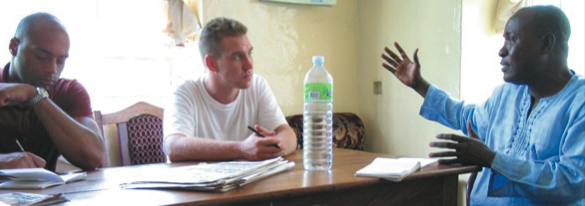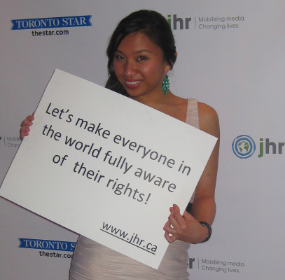The following is an excerpt from a piece I wrote in Peace Magazine for the October-December issue.
"Awareness is the first and most necessary step in ending human rights abuses.” ...it’s a statement I have found myself saying over and over again both to myself and to others when talking about human rights violations around the world and the media’s role in reporting these issues. After all, if people aren’t aware of the rights and freedoms they are entitled to, how can one possibly, in the words of the ever-wise Bob Marley, “get up, stand up—stand up for your rights”?
Yes, awareness is the answer. It’s so intuitive, so common sense, so simple. But alas, common sense does not necessarily reflect reality and simple does not mean easy. Regrettably, around the world, including some of the most developed and prosperous countries, there is an outrageous and glaring lack of awareness of our most basic and fundamental human rights.
The media have a huge role to play in solving this problem by highlighting the gap between every individual’s guaranteed human rights and what they experience in reality. With their ability to reach millions of people, whether through print, radio, television, or now in our increasingly digital world, the Internet, the media are essential to a vibrant democracy that does not tolerate arbitrary abuse.
 Journalists for Human Rights trainers working alongside a local journalist in Ghana
Journalists for Human Rights trainers working alongside a local journalist in Ghana
Let me demonstrate. A single radio station in the Democratic Republic of the Congo (DRC), the most important medium for information in the country, reaches thousands of Congolese people. Now multiply that by the approximately 360 local community radio stations that exist in the DRC and imagine the number of people who can be informed of their rights. In fact, a study in Ghana on the UN Convention on the Rights of the Child found that the media was the largest source of information about the treaty. The media thus has the power to expose human rights abuses when they happen, to hold relevant actors accountable for their actions, and to empower marginalized and vulnerable communities to speak out and protect themselves.
But herein lies the rub: We live in a world where press freedom has been on the decline, where only 35% of all the countries in the world enjoy a free press, and where the infrastructure for a strong and independent media is, in many countries, virtually nonexistent.
In such a situation, it is no wonder that investment in local media is largely missing from the wider discussion of international development. Indeed, media development makes up a meager 0.5% of all international development efforts.
Despite this seemingly insignificant number, some organizations are working tirelessly to strengthen the journalism sector in some of the harshest conditions in the world—and are even achieving tangible success. To continue reading, download the PDF here.

